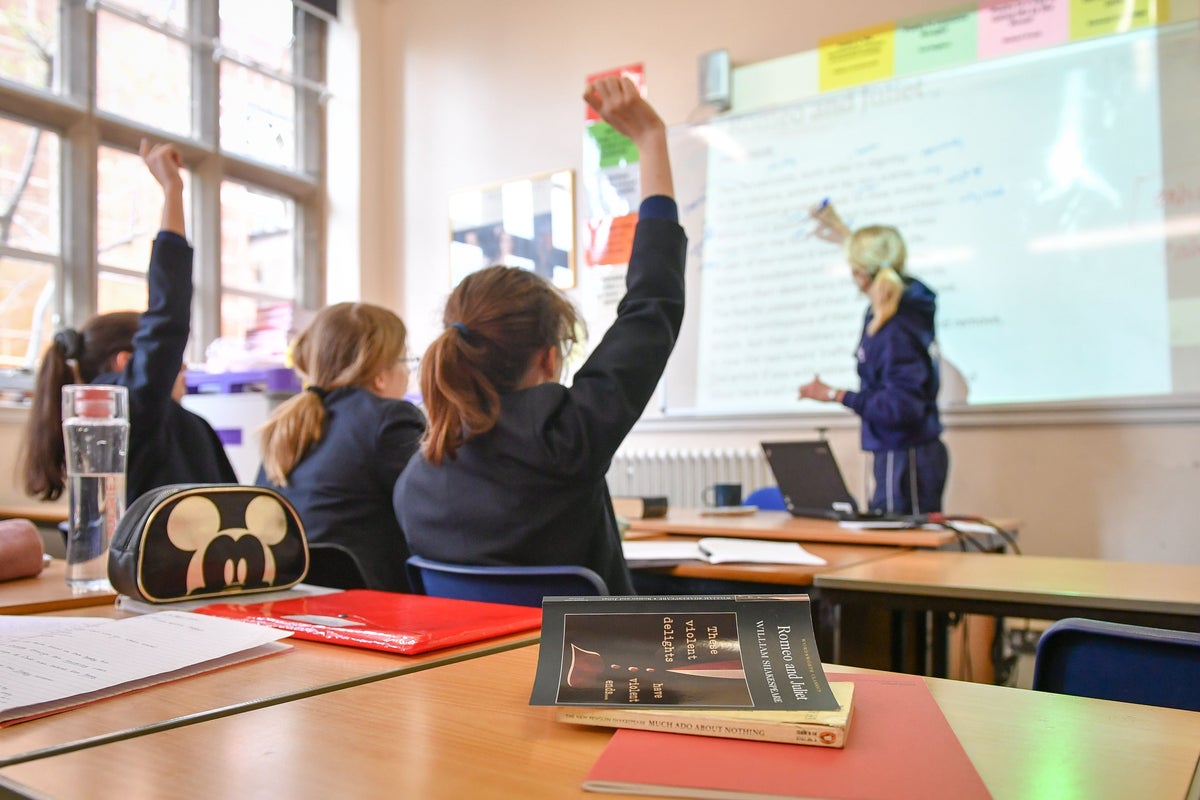
Only one in 10 state schools say all their pupils are studying a language at GCSE level, compared with nearly a third of private schools, a report suggests.
Four in five (79.5%) independent schools said they offer German at Key Stage 4 (ages 14-16) compared with just 37.6% of state secondary schools, according to the British Council’s annual Language Trends report.
The survey, of teachers at 1,316 schools in England, found that just 10.7% of state schools said all of their pupils are taking a language for GCSE, compared with 31.3% of independent schools.
The English Baccalaureate (EBacc) – a government measure – aims to make sure that pupils take English, maths, science, a humanities subject and a language at GCSE.
The Government’s aim is to see 90% of pupils studying the EBacc subject combination at GCSE by 2025, but the report suggests there is “a considerable way to go” to accomplish that ambition.
German entries at GCSE in England dropped from 36,933 in 2021 to 34,966 last year, and the proportion of state schools offering German is significantly lower than independent schools, the report suggests.
After Spanish, French and German, Chinese (Mandarin) is the most popular language taught as a full curriculum subject in state secondary schools in England. Latin holds this spot in the independent sector.
Entries for other modern Languages in England (languages other than French, German, Irish, Spanish and Welsh) at GCSE rose to 35,202 in 2022 from 24,103 in 2021, which is the highest number recorded by the annual survey.
These languages could include Arabic, Bulgarian, Polish, Mandarin, Portuguese, Russian and Urdu.
Report author Dr Ian Collen said the increased take-up is “most likely due to the fact that many of these learners are seeking certification in ‘home/heritage’ languages” which was difficult to do in the pandemic years.
The report also found that one-third of primary school teachers said allocated time for language learning has been affected this year because extra time has been spent on literacy and numeracy.
Meanwhile, more than two-thirds (71.8%) of primary school teachers said they received no funding to develop resources for language teaching this year.
Earlier this year, University College London, the British Council and the Goethe-Institut were awarded £14.9 million by the Department for Education (DfE) to establish a consortium of “Hub Schools” to increase uptake of language qualifications in English state schools under the umbrella of the National Consortium for Languages Education (NCLE).
Dr Collen said: “The data from this year’s Language Trends report show clear areas for improvement in schools across England, particularly in relation to the time and resource placed in language learning and the uptake of German at GCSE and A-level.
“However, it is reassuring to see positive steps being taken by decision-makers to improve languages in England.”
Vicky Gough, schools adviser at the British Council, said: “After worrying signs of decline in language learning and evidence of a growing social divide when it comes to children learning modern languages, formation of the NCLE (National Consortium for Languages) is welcome news, and the British Council is proud to be part of the consortium.
“However, progress still needs to be made to rebuild international engagement in schools in England which has strongly declined over the last few years.
“We need to give our young people more opportunities to learn about and engage with different cultures.”
A DfE spokesman said: “In our globalised economy, language skills add value and widen opportunities for individuals, communities and society and so it’s excellent to see in this report how popular Spanish has become as an A-level choice.
“The department is committed to providing high quality language teaching in schools, increasing languages uptake at GCSE and levelling up opportunities for disadvantaged pupils.
“German is a strategically important language to the UK, particularly with regard to business and industry and so to boost take-up of German in schools, there will be a distinct German Promotion Project within our new £14.9 million Language Hubs programme.”







